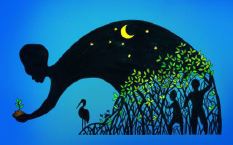Call for submissions on the theme 'Anthroposcenes in Africa: lived experiences of planetary transformation'
 Climate change and extreme weather events – droughts, floods, and storms – across the African continent, as well as the ‘new scramble for Africa’s resources’ raise questions about Anthropocene futures. Historical insights into trajectories of waste, toxicity, pollution (Hecht 2009, 2018; Peša 2022; Yusoff 2021) and forms of ‘slow violence’ (Nixon 2011) have effectively problematised the framing of a single, planetary Anthropocene. Anthropocene responsibilities and vulnerabilities are unevenly distributed across the globe: anthroposcenes look differently everywhere. New Anthropocene realities and narratives for Africa are emerging, ranging from apocalyptic scenarios (Roe 1999) to dreams of technological salvation. Such unfolding discourses largely render local experiences and voices mute. In a Special Issue for Grassroots the guest editors invite for reflections on grassroots’ challenges, lived experiences and perspectives, and ask how interdisciplinary environmental humanities approaches can better bring the plural lived experiences of Anthroposcenes in Africa into view.
Climate change and extreme weather events – droughts, floods, and storms – across the African continent, as well as the ‘new scramble for Africa’s resources’ raise questions about Anthropocene futures. Historical insights into trajectories of waste, toxicity, pollution (Hecht 2009, 2018; Peša 2022; Yusoff 2021) and forms of ‘slow violence’ (Nixon 2011) have effectively problematised the framing of a single, planetary Anthropocene. Anthropocene responsibilities and vulnerabilities are unevenly distributed across the globe: anthroposcenes look differently everywhere. New Anthropocene realities and narratives for Africa are emerging, ranging from apocalyptic scenarios (Roe 1999) to dreams of technological salvation. Such unfolding discourses largely render local experiences and voices mute. In a Special Issue for Grassroots the guest editors invite for reflections on grassroots’ challenges, lived experiences and perspectives, and ask how interdisciplinary environmental humanities approaches can better bring the plural lived experiences of Anthroposcenes in Africa into view.
How can grassroots’ experiences and voices be visibilised in global conversations about climate change, the heightened global demand for ‘green’ energy, and low-carbon technologies? The editors seek contributions that show the importance of gender, class, and locality in adapting to the Anthropocene and shaping its futures. Do historical and contemporary studies of the science-technology-environment nexus hold the potential to contribute to more equitable futures? What can we learn from studying past and present environmental injustices, e.g. conservation, resource extraction, waste, slow violence, and toxicity? How can local lived experiences, knowledge and struggles over sovereignty of natural resources and land inform these global debates?
More information about the theme and how to submit manuscripts.

